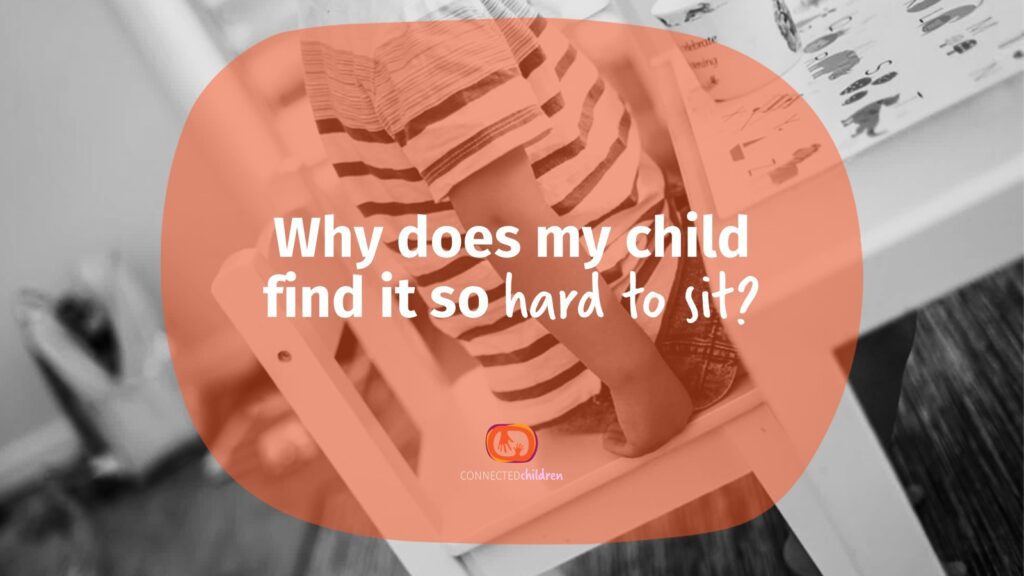
This may sound like a small thing but when sitting is hard, it means many everyday activities can become really difficult. Sitting skills matter not only for learning but also social and emotional reasons too.
But remember, difficulties sitting are not just about the child.
Sitting is more of an issue these days than it used to be. There are greater expectations placed upon children at school, the demands of the curriculum have increased and children are sitting for longer.
Kids have less time outside than we did when we were kids. These reduced rates of physical activity can mean their movement needs may not be met. So, when children are asked to sit, it can be much harder for them.
So, why might your child have trouble sitting?
There are many ways to think about this, here are some points to get you started..
- Can their body do this? Are there physical reasons such as low muscle tone. When they have low muscle tone, they can fatigue faster than other children which means they just don’t have the endurance for everyday tasks.
- Is it the sitting that is hard or is it the task that I want them to sit for? Is the activity that they are needing to sit to do, something that causes anxiety, such as handwriting.
- Is the task too hard or too easy? If it’s too hard, it is natural to avoid the task, but keep in mind if it’s too easy, this can be equally problematic. We all like to be challenged, just enough, to keep things interesting.
- What do they associate with this sitting? This is a classic one when thinking about picky eaters at the dinner table. If mealtimes bring anxiety and stress for them and the people around them, then they won’t want to sit.
- They may be moving in order to meet sensory needs. They may need lots of whole body feedback to help them to focus. This may sound strange, but they may need be moving more in order to help them sit as still as they can.
- Is their body used to this routine? Children need their world to be predictable to feel safe, their bodies thrive on routine. This is true for all of us, for example, have you ever tried to fall asleep 3 hours earlier than you normally do? Does their body know this it is ‘sitting time’ and how long they need to sit for? Keeping your expectations realistic as well as consistent is important.
- Is it a sensory thing? Do they notice sensory input (what they see, hear and feel) more than others and is it distracting them? If they are distracted by their sensory environment, it may be hard for them to stay still.
- Have there been any changes to their routine that would make this harder for them, for example, are they likely to be more tired at the moment?
- Are they trying to tell you something that they do not have words for. For example, ‘I am feeling really anxious that it is reading groups at school today’. ‘I am still recovering from falling over at cross country in front of my friends today’. When children don’t have the words to say how they feel, they may use their body.
- Are they in a situation that reminds them of something that makes them feel small or unsettled.
- Are they being asked to sit when they are more likely to be hungry, tired or overwhelmed.
These are just some of the reasons that your child may find sitting difficult and this is why behaviour management strategies can fall so short when supporting our children. Instead using a behavioural approach (stickers for sitting etc), if we actually help address the reason why the sitting is so hard, and think it through in more depth, this can support our children towards much better long term outcomes.
Last point for reflection, if your child is struggling to sit for some tasks, is there an alternative you can offer? For example, if sitting at the dinner table is hard, can you give them a therapy ball to sit on or have dinner on a picnic blanket in the yard sometimes?
Lots to think about on this one, hope you found it helpful.
